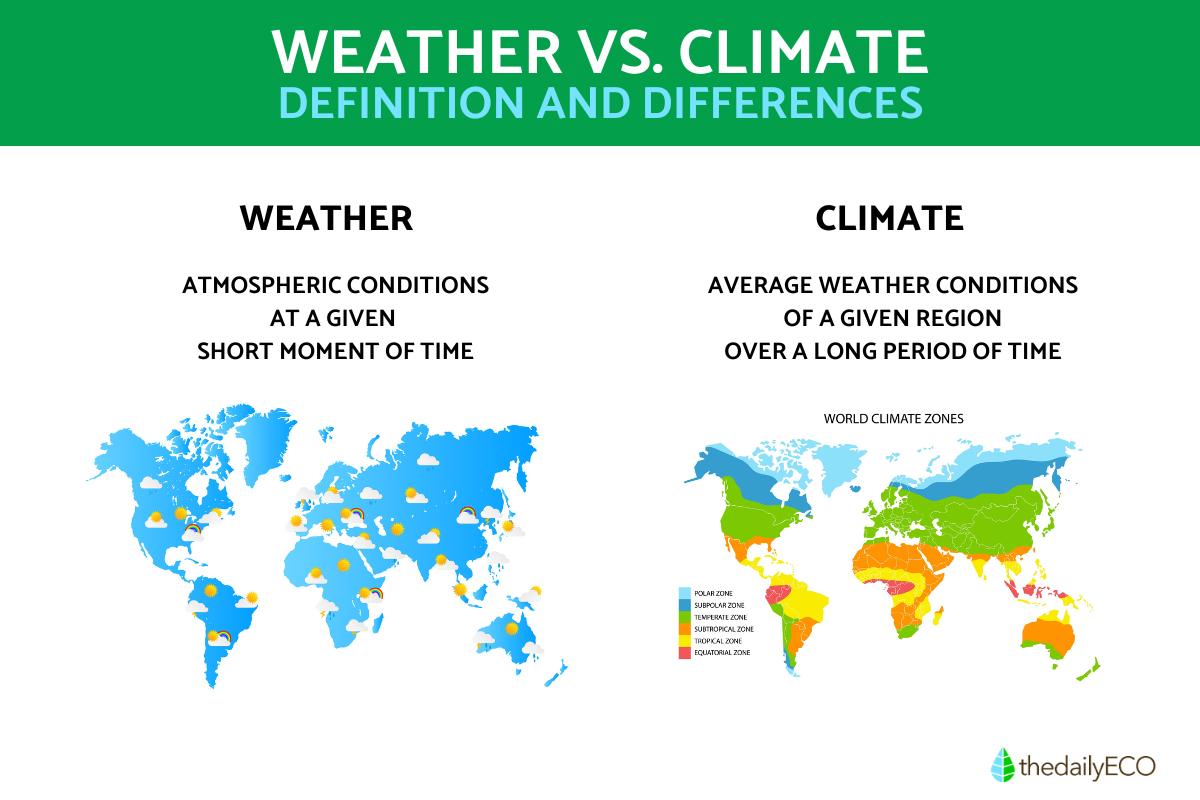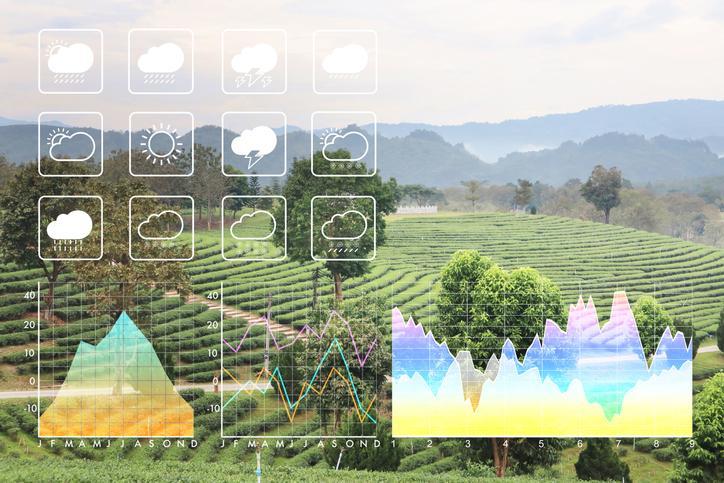The Differences Between Climate and Weather


Climate and weather are often used interchangeably, but the differences between climate and weather are important. They both apply to a certain geographical area, but as concepts they help us to understand ecosystems differently. It is for this reason thedailyECO explains the differences between climate and weather. We look at definitions of them both, as well as how their meteorological elements are measured.
Explaining the difference between climate and weather
The words weather and climate cannot be used interchangeably despite the closeness of their concepts. There is a fundamental difference that separates and distinguishes them. Specifically, time.
When we talk about weather, we are referring to atmospheric conditions such as temperature, humidity or pressure in a given area. These conditions affect the area for a relatively brief moment. This is why a weather forecast can only predict what these atmospheric conditions will be like in the near future.
In comparison, climate refers to all those same atmospheric values, but valued as an average for a given region over a long period of time. For this reason, we can say a certain geographic area has a sunny climate, even on a atypically rainy day.
One of the most important reasons for understanding the difference between weather and climate is climate change. The weather on a given day can be changeable, but not have a drastic effect on a given ecosystem. However, when the climate of an area changes, the plants, animals and all living organisms which live within it can be affected detrimentally.
Understand how we can positively influence climate change with our article on how to protect nature's ecosystems.

What is climate?
As we have stated above, we can define climate as the weather statistics over a long period of time. While this period will change according to our specific research needs, we often look at changes to climate over periods of 30 years. This is a good sampling of weather to help define the climate of a given region. The climate system of said region is determined by variations in five weather components. These components are:
- Atmosphere
- Hydrosphere
- Cryosphere
- Lithosphere
- Biosphere
The climate is also affected by other factors, such as to the topographic relief or the vegetation of a geographical area. Learn more about climactic definitions with our related article on types of climate.
Weather elements
Since weather elements will determine how a given area's climate is defined, it can be helpful to look at what are the elements which constitute weather. They are:
- Atmospheric temperature: as the name indicates, this the level of heat or cold that the air has at a certain place and time. This is mainly affected by solar radiation, something which changes depending on planetary and geographical factors. Atmospheric temperature and precipitation are the two most important weather elements that create a climate. Learn more about the constitution of our atmosphere by finding out what is the magnetosphere?
- Precipitation: includes any form in which water from the clouds of the atmosphere falls to the surface of the earth. Forms of precipitation include rain, snow and hail.
- Atmospheric pressure: the weight that air masses exert in all directions. The higher the altitude, the less this weight due to there being less air in the region above. Temperature also causes air to expand and lose density. As with altitude, the higher the temperature, the lower the pressure.
- Wind: it is the movement of air that exists throughout the atmosphere. This movement is caused by factors such as the uneven heating of the Earth by the sun, as well as the Earth's planetary rotation.
- Humidity: among the weather elements of climate is atmospheric humidity, i.e. the amount of water in the form of vapor that is present in the atmosphere. While humidity is caused by moisture, its changes are greatly determined by temperature.
- Water evaporation: the physical process by which water passes from its liquid state to its gaseous state.
- Cloudiness: the type and amount of clouds that are in the atmosphere.
As we have explained, the sun has a great effect on the climate and weather of a region. You can learn more about the nature of this star by looking at our article on why is the sun yellow?
Climate elements
In addition to weather elements, there are other factors which can influence the climate of a given region. They include:
- Latitude: the angular distance between a certain point and the terrestrial equator. This influences the angle of incidence of solar radiation. In turn, this affects the intensity with which it heats the area, as well as the length of days and nights.
- Altitude: the vertical distance between a specific point and sea level. This has a great impact on the climate, since higher altitudes always mean lower temperatures and lower pressures. The thermal floors are given by the altitude.
- Distance to the sea: it is important due to the influence of large bodies of water and their ability to retain heat for longer than the continental surface. Areas far from the sea have a greater thermal amplitude, since they do not experience its cooling effects.
- Ocean currents: they move enormous amounts of water from places with different temperatures, acting like the pipes or sections of a radiator or refrigerator.
- Relief orientation: marks whether an area is sunny or shady, marking how much it receives the sun's rays.
- Direction of the planetary and seasonal winds: winds fulfill a function similar to that of ocean currents, moving large masses of air in motion, with different temperatures and storms or other atmospheric effects.

What is weather?
Sometimes referred to as atmospheric weather, weather refers to the state of all those atmospheric factors in a single place and at a specific time. It is what we look at when we mention if tomorrow it is going to rain or if it will be sunny. The same applies to periods in the past. It is what we see in the weather report or the weather forecast.
The weather has been studied in depth since ancient times precisely because the deeper our knowledge of it, the more accurately we can predict what the next changes in weather will be. Such changes are very important for societies since they determine when we can travel, grow certain foods, be outside or many other basic factors necessary for survival.
Meteorology is the branch of sciences which endeavors to study weather patterns and climate. It is particularly focused on determining weather patterns in the near future, resulting in the meteorological forecasts on which we all rely to some extent.
Meteorological instruments to measure the weather
To finish knowing the difference between climate and weather, we only have to finish talking a little more about the latter. It is also very important to know the meteorological instruments to measure the weather and make a weather or meteorological prediction:
- Thermometer: allows us to measure the atmospheric temperature of a place at a specific time. This is how the maximum, average and minimum temperatures of an area are known.
- Barometer: measures atmospheric pressure.
- Anemometer: measures the speed of the wind.
- Rain gauge: measures the precipitation of rain, hail and snow.
- Vane: it helps us to know the direction of the wind.
Learn about one particular weather phenomenon in our related article on what is the St. Elmo's Fire phenomenon?

If you want to read similar articles to The Differences Between Climate and Weather, we recommend you visit our Facts about nature category.







